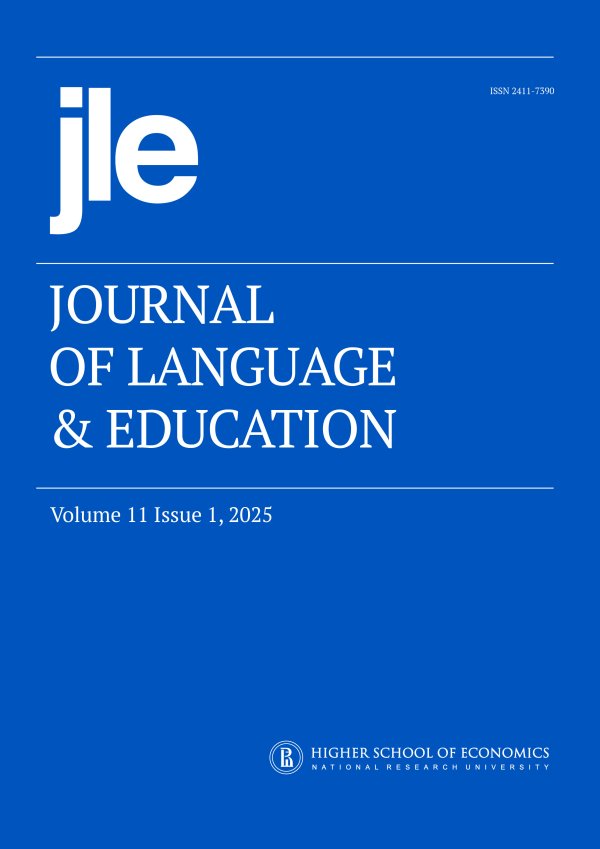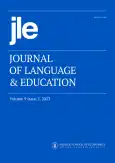The relationship between the perception and knowledge of academic vocabulary among EFL and EMI university students
- Авторы: Makovskaya L.1, Juraeva I.1
-
Учреждения:
- Westminster International University in Tashkent
- Выпуск: Том 9, № 2 (2023)
- Страницы: 133-145
- Раздел: Оригинальное исследование
- URL: https://journal-vniispk.ru/2411-7390/article/view/301913
- DOI: https://doi.org/10.17323/jle.2023.16113
- ID: 301913
Цитировать
Полный текст
Аннотация
Background. Academic vocabulary is considered an essential component in the English language courses in higher education establishments. A number of studies have illustrated that the use of academic words in students’ work alone cannot always promise high grades, since students’ opinion about the importance of academic words can also have an influence on their knowledge and use.
Purpose. The research aims to determine the relationship between the vocabulary level of learners and their beliefs about the importance of academic words at the tertiary level.
Methods. For this study, the first and third-year students (N=440) in two Uzbek universities completed a beliefs questionnaire to rate their perceptions of the significance of academic words in improving reading, writing, speaking, and listening skills in academia. The participants were also administered a vocabulary knowledge test to estimate their receptive dimension.
Results. The findings demonstrate that EMI students scored higher on the vocabulary test than EFL students and show that students’ perceptions of the significance of academic words changed in all four skills from the first to third year of study.
Conclusion. The article explores trends that emerged in the data and raises awareness for EAP teachers concerning the assumptions about students’ needs for vocabulary development based on learners’ perceptions and knowledge.
Об авторах
L. Makovskaya
Westminster International University in Tashkent
Автор, ответственный за переписку.
Email: lmakovskaya@wiut.uz
I. Juraeva
Westminster International University in Tashkent
Email: juraevaijobat@gmail.com
Список литературы
- Browne, C., Culligan, B., & Phillips, J. (2013). The New Academic WordList (NAWL). New General Service List Project. https://www.newgeneralservicelist.com/new-general-service-list-1.
- Brun-Mercer, N., & Zimmerman, C.B. (2015). Fostering academic vocabulary use in writing. The CATESOL Journal, 27(1), 131-148. https://files.eric.ed.gov/fulltext/EJ1111751.pdf.
- Campion, M. E., & Elley, W. B. (1971). An academic vocabulary list. NZCER.
- Choo, L.B. et al. (2017). The Significance of the Academic Word List among ESL tertiary students in a Malaysian Public University. The Southeast Asian Journal of English Language Studies, 23(4), 56-65. DOI: https://doi.org/10.17576/3L-2017-2304-05
- Coxhead, A. (2000). A New Academic Word List. TESOL Quarterly, 34(2), 213-238. DOI: https://doi.org/10.2307/3587951
- Coxhead, A. (2012). Academic vocabulary, writing and English for academic purposes: Perspectives from second language learners. RELC Journal, 43(1), 137-145. DOI: https://doi.org/10.1177/0033688212439323
- Coxhead, A., Dang, T., & Mukai, S. (2017). Single and multi-word unit vocabulary in university tutorials and laboratories: Evidence from corpora and textbooks. Journal of English for Academic Purposes, 30, 66-78. DOI: https://doi.org/10.1016/j.jeap.2017.11.001
- Cribb, V.M., & Wang, X. (2021). Making academic vocabulary count through strategic deployment in oral presentations by Chinese students of English. The Language Learning Journal, 49(2), 251-264. DOI: https://doi.org/10.1080/09571736.2019.1566396
- Csomay, E. (2020). A corpus-based study of academic word use in EFL student writing. In U. Roemer, V. Cortes, & E. Friginal (Eds.), Advances in corpus-based research on academic writing (pp. 9-32). John Benjamins. http://digital.casalini.it/9789027261458.
- Csomay, E., & Prades, A. (2018). Academic vocabulary in ESL student papers: A corpus-based study. Journal of English for Academic Purposes, 33,100-118. DOI: https://doi.org/10.1016/j.jeap.2018.02.003
- Crossman, K. (2018). Immersed in academic English: Vocabulary and academic outcomes of a CLIL university preparation course.International Journal of Bilingual Education and Bilingualism, 21(5), 564-577. DOI: https://doi.org/10.1080/13670050.2018.1494698
- Dang, T.N.Y. (2018). The nature of vocabulary in academic speech of hard and soft sciences. English for Specific Purposes, 51, 69-83. DOI: https://doi.org/10.1016/j.esp.2018.03.004
- Durrant, P. (2016). To what extent is the Academic Vocabulary List relevant to university student writing? English for Specific Purposes, 43, 49-61. DOI: https://doi.org/10.1016/j.esp.2016.01.004
- El-Dakhs, D. (2015). The Arab university students' use of english general service and academic vocabulary: A lexical development study. English Language Teaching, 8(6), 32-49. DOI: https://doi.org/10.5539/elt.v8n6p32
- Gardner, D., & Davies, M. (2013). A New Academic Vocabulary List. Applied Linguistics, 35(3), 305-327. DOI: https://doi.org/10.1093/applin/amt015
- Gyllstad, H., Vilkaitė, L., & Schmitt, N. (2015). Assessing vocabulary size through multiple-choice formats: Issues with guessing and sampling rates.International Journal of Applied Linguistics, 166(2), 278-306. DOI: https://doi.org/10.1075/itl.166.2.04gyl
- Hyland, K., & Tse, P. (2007). Is there an Academic Vocabulary? TESOL Quarterly, 41(2), 235-253. DOI: https://doi.org/10.1002/j.1545-7249.2007.tb00058.x
- Hyland, K., & Tse, P. (2009). Academic lexis and disciplinary practice: Corpus evidence for specificity.International Journal of English Studies, 9(2), 111-129. DOI: https://doi.org/10.6018/ijes.9.2.90781
- Khani, R., & Tazik, K. (2013). Towards the development of an Academic Word List for applied linguistics research articles. RELC Journal, 44(2), 209-232. DOI: https://doi.org/10.1177/0033688213488432
- Köse, G., & Yuksel, I. (2013). ELT majors' cross sectional evaluation of academic lexical competence and performance. Journal of Language Teaching and Research, 4(2), 244-252. DOI: https://doi.org/10.4304/jltr.4.2.244-252
- Laufer, B., & Goldstein, Z. (2004). Testing vocabulary knowledge: Size, strength, and computer adaptiveness. Language Learning, 54(3), 399-436. DOI: https://doi.org/10.1111/j.0023-8333.2004.00260.x
- Malmström, H., Pecorari, D., & Shaw, P. (2018) Words for what? Contrasting university students' receptive and productive academic vocabulary needs. English for Specific Purposes, 50, 28-39. DOI: https://doi.org/10.1016/j.esp.2017.11.002
- Masrai, A., & Milton, J. (2018). Measuring the contribution of academic and general vocabulary knowledge to learners' academic achievement. Journal of English for Academic Purposes, 31, 44-57. DOI: https://doi.org/10.1016/j.jeap.2017.12.006
- Moon, Y. (2017). Are different types of vocabulary needed for comprehending general and academic texts? English Teaching, 72(3), 47-68. DOI: https://doi.org/10.15858/engtea.72.3.201709.47
- Nation, P. (2001). Learning Vocabulary in Another Language. Cambridge University Press.
- Nation, P., & Beglar, D. (2007). A vocabulary size test. The Language Teacher, 31(7), 9-13.
- Paribakht, T.S., & Webb, S. (2016). The relationship between academic vocabulary coverage and scores on a standardized English proficiency test. Journal of English for Academic Purposes, 21, 121-132. DOI: https://doi.org/10.1016/j.jeap.2015.05.009
- Praninskas, J. (1972). American University Word List. Longman.
- Qian, D.D. (2002). Investigating the relationship between vocabulary knowledge and academic reading performance: an assessment perspective. Language Learning, 52(3), 513-536. DOI: https://doi.org/10.1111/1467-9922.00193
- Roche, T., & Harrington, M. (2013). Recognition vocabulary knowledge as a predictor of academic performance in an English as a foreign language setting. Language Testing in Asia, 3(1), 1-13. https://link.springer.com/article/. DOI: https://doi.org/10.1186/2229-0443-3-12
- Saud, M.S. (2023). Measuring the academic vocabulary size of university students in Nepal. MEXTESOL Journal, 47(1). https://www.mextesol.net/journal/index.php?page=journal&id_article=46397.
- Schmitt, N., Schmitt, D., & Clapham, C. (2001). Developing and exploring the behaviour of two new versions of the Vocabulary Levels Test. Language Testing, 18(1), 55-88. DOI: https://doi.org/10.1177/026553220101800103
- Teng, F. (2016). An in-depth investigation into the relationship between vocabulary knowledge and academic listening comprehension. TESL-EJ, 20(2).
- Vidal, K. (2003). Academic listening: A source of vocabulary acquisition? Applied Linguistics, 24(1), 56-89. DOI: https://doi.org/10.1093/applin/24.1.56
- Warnby, M., Malmström, H., & Hansen, K. Y. (2023). Linking scores from two written receptive English academic vocabulary tests-The VLT-Ac and the AVT. Language Testing, 40(3), 548-575. DOI: https://doi.org/10.1177/02655322221145643
- Xue, G., & Nation, P. (1984). A University Word List. Language Learning and Communication, 3(2), 215-229.
Дополнительные файлы











